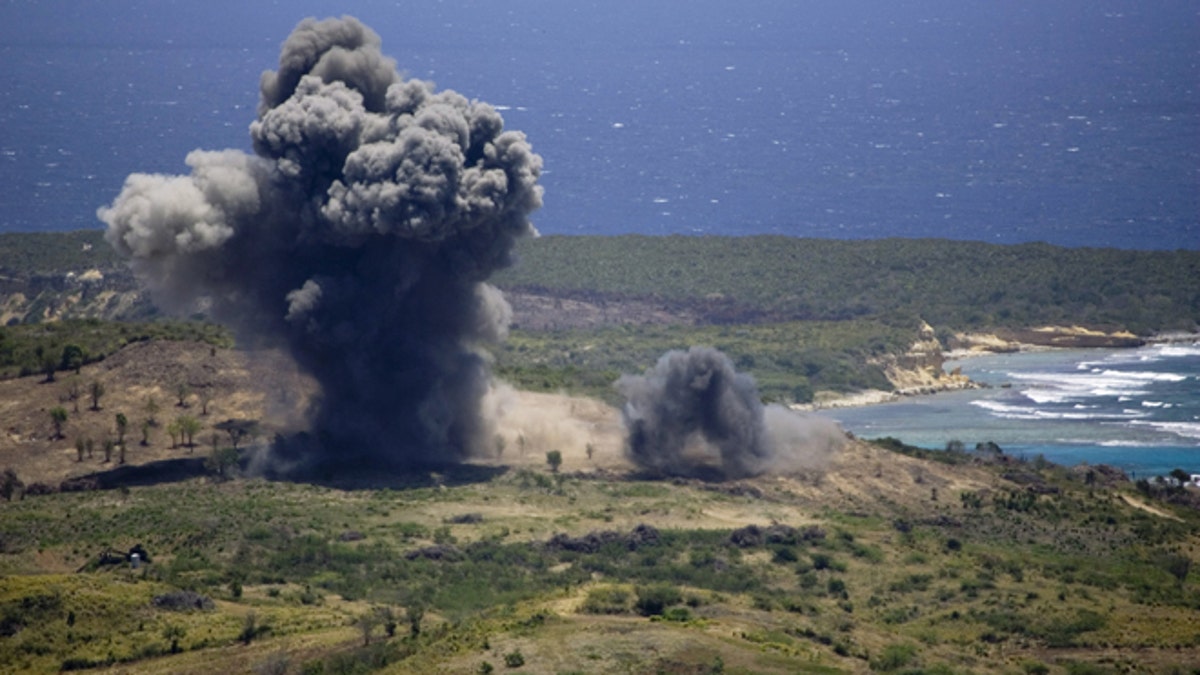
FILE - In this April 17, 2008 file photo, unexploded ordinance is blown up in a controlled demolition at the former U.S. Naval Training Range on Vieques island, Puerto Rico. A U.S. Agency has issued a long-awaited report saying it did not find any proof that decades of military activity in the Puerto Rican island of Vieques sickened residents who blame the federal government for high rates of cancer, asthma and other illnesses. (AP Photo/Brennan Linsley, File)
SAN JUAN, Puerto Rico – There is no proof that decades of military practice bombing on the Puerto Rican island of Vieques sickened residents who blame it for high rates of cancer, asthma and other illnesses, a long-awaited U.S. agency report stated.
The report was released this week and follows four previous assessments and several updates by the Agency for Toxic Substances and Disease Registry that reached similar conclusions.
Local residents and officials, who blame the military for health problems, vowed to keep pushing the U.S. government for more studies analyzing the impact of the now-ceased Navy activity on Vieques, which lies east of the U.S. territory's main island. About 10,000 people live there.
The Navy occupied the island's eastern and western areas in 1941-2003, using it for warships and aircraft to practice firing live bullets, artillery rounds, rockets, missiles and bombs, according to the report.
The Navy has said its forces accidentally fired 263 rounds of ammunition tipped with depleted uranium in 1999, violating federal law.
- US and Puerto Rico Sign Police Reform Agreement
- Puerto Rico Wants Action Amid Bond Rating Drop
- Puerto Rico’s Pension Problem Could Send Economy Over the Edge
- Puerto Rico: Top Court Upholds Straight-Only Adoptions
- Puerto Rico to Activate National Guard to Fight Crime, Smuggling
- Best Pix of the Week
- Best Sports Pix of the Week
- Borinqueneers: Puerto Rico’s Forgotten Heroes
That same year, a pilot dropped a bomb on an observation tower and killed a civilian, setting off years of angry protests that led President George W. Bush to end military activity on Vieques in 2003. The property once owned by the Navy is now a national wildlife refuge.
The U.S. has since removed more than 16.5 million pounds of munitions in a cleanup expected to last through at least 2025.
The U.S. agency's latest report on Vieques angered many on the island, including community leader and activist Robert Rabin.
"It's a repetition of a long line of administrations in Washington that have sought to relieve themselves of any liability or responsibility for the horrific environmental, health and economic damages caused by a half century of military presence and activities here," Rabin said in a phone interview.
The agency's director, Dr. Christopher Portier, said the 169-page report reached two conclusions: that there is credible evidence people in Vieques have poorer health than elsewhere in Puerto Rico and that scientists could not find a link between military operations and people's health.
"That doesn't mean those linkages don't exist," he said. "It means we can't find credible scientific evidence to support that."
The agency said that the public water supply was safe and that there were no air contaminants. However, it recommended additional soil testing in residential areas, stating there was still uncertainty about soil contamination because current data were inadequate.
Officials said they found mercury in local seafood, but blamed it on the general presence of the metal worldwide. They also noted that there were no unusually high concentrations of mercury in a fish sampling.
Officials said they did not analyze the possible effect of absorbing a mix of chemicals through food, air and water, saying they did not know the levels of chemicals that residents might have been exposed to.
The agency "recognizes the possibility that this report cannot address accurately the effects of mixtures and cumulative exposures on the health of Viequenses," the report stated.
During 2001-2003, the U.S. government released four reports stating it found no health hazards in Vieques' air, soil, seafood and drinking water. Several scientists from the University of Puerto Rico, the University of Georgia and Yale University disagreed, saying residual contaminants were affecting the health of local residents.
In February 2012, a U.S. appeals court upheld a decision to dismiss a lawsuit in which 7,100 residents of Vieques accused the federal government of causing illnesses.
Among residents who blame the contaminants for their illnesses is Hermogenes Marrero, a retired U.S. Marine sergeant in his early 60s who worked in Vieques in 1970-1972. He said he is moving from Puerto Rico to the U.S. next month to ensure his colon cancer is in remission and to get treatment for chronic obstructive pulmonary disease.
He accused the U.S. government of burying evidence.
"They don't want to find the link," he said in a phone interview. "They're going to keep quiet about it."
Portier, the U.S. agency's director, denied that and said he wants to form a coalition with the Puerto Rico Health Department and possibly other federal agencies to help carry out more studies.
"Sometimes we fail. Sometimes we can't get enough interest and resources to a site," he said. "At this point, all I can say is we will try and we will partner as best we can."
The agency's report said a higher mortality rate especially from cancer could be partly blamed on a lack of access to adequate medical care.
Based on reporting by The Associated Press.
Follow us on twitter.com/foxnewslatino
Like us at facebook.com/foxnewslatino
